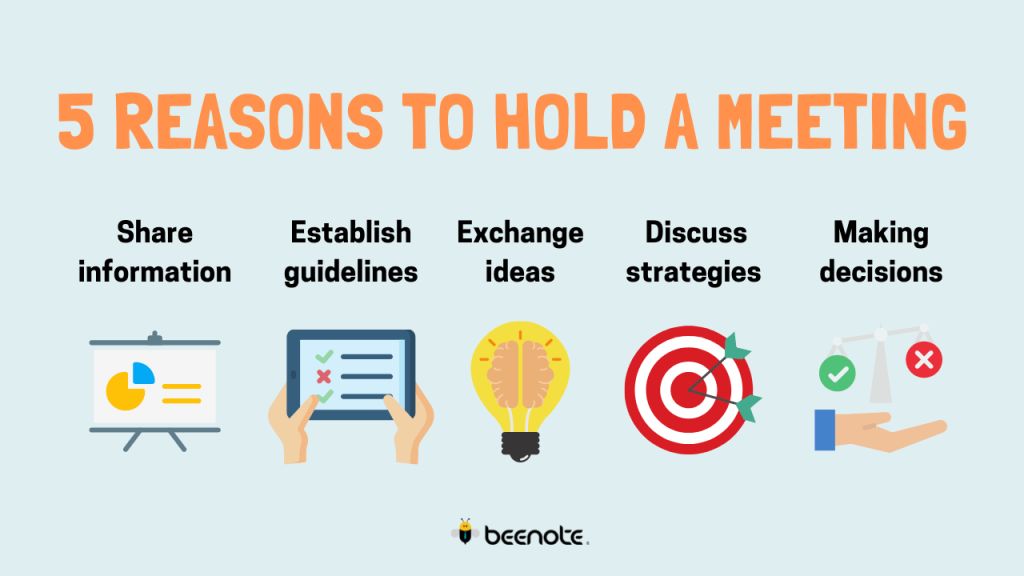If I asked you to raise your hands to tell me if you like meetings, I would probably see one or two people timidly lift their arms. We often wonder what the reasons to hold a meeting are or what the purpose of the meeting is… Unfortunately, meetings have become the black sheep of work.
Currently, meetings are perceived as unproductive, monotonous, repetitive, with no real objective and no follow-up. This is not a positive observation. However, it is possible to reverse this tendency and understand why we have come to this conclusion.
My experience helped me understand that one of the main problems is that, basically, people don’t understand why we meet. We said we should hold a team meeting every week, but we don’t know why. Have we become meeting automata?
Why we should hold meetings?
Meetings are at the heart of our operations. They are essential to the successful development of an organization’s projects and operations in order to achieve the established objectives.
However, you should focus on them. You should hold productive meetings because they’re opportunities to promote exchange between employees and the progress of your projects.
Moreover, they are also important for the management of the executive committees or board of directors which are the foundations of the good functioning of an organization. Communication is the key to success!
Here are 5 reasons to hold a meeting
1. Share information
Provide information to members of our team. The regular department meetings are a perfect example of that. Since their purpose is to allow an exchange of information between employees, it’s important to have information to communicate before inviting people to this type of meeting.
Try our briefing agenda template for information-sharing meetings to save time and get to the point.
2. Establish guidelines
Meetings can be used to establish guidelines. In any organization, there are times when decisions must be made regarding the management of a project or work tasks. Decisions that are made by a majority of participants are by far the best decisions. After all, they are the ones who put their hands to work.
It’s important to present the right information so that informed decisions can be made.
3. Exchange ideas
Allow exchanges, brainstorming, and consultation. The goal here is to share and maximize the potential of a group to advance a project. Avoid doing monologues and, instead, take advantage of the value of the group.
Try our project meeting agenda template to leave more room for constructive discussion.

4. Discuss operational strategies
The main purpose of the executive meeting is to bring together different directors to discuss strategies and follow-ups surrounding the organization, which are then approved by the board of directors.
Several topics can be discussed depending on the department and the company, but these meetings are primarily used to review the actions taken during previous executive committee meetings.
The executive committee is the continuity of the decisions taken by the board of directors toward the implementation of the different departments of an organization.
In smaller structures, operational issues may be discussed, while larger ones will be mainly concerned with strategic issues.
Try our executive committee agenda template for a structure that allows you to get to the point.
5. Making decisions
The main purpose of a board meeting is to bring members together to make important decisions for an organization. It is through a structured, yet simple, approach to planning, executing, and following up on meetings and decisions that good governance can be achieved.
Try our board agenda template to increase member collaboration and the quality of decision-making. Use it with Beeboard, the complete Board of Directors package with its secretary mode for confidential note-taking, voting function, and more!

The importance of the objective of your meetings
It’s possible to hold a meeting for many of those reasons. Sure, you can, in the same meeting, inform your employees about something, make a decision on another point, and request a consultation for another. However, it’s not a common practice. Mixing the objectives of a meeting require great planning, both from the leader and the participants.
It’s therefore important to ask ourselves what purpose we should aim to set the agenda and determine who will be invited to this meeting.

Beenote offers you this flexibility through a simple approach to planning meetings; you establish goals for each point. That way, participants understand why a meeting is held and they can prepare themselves adequately. Informed people participate more and better.









0 Comments